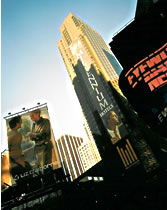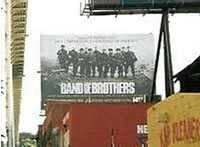 The
day I wish to describe here is not that of the 11th of September but the
last day I spent in New York in search of an airline to take me out of
the beleaguered city—its bridges, tunnels and airports were closed
down for a few days. I walked from 58th and Columbus Avenue to 42nd Street
and Times Square to an airline office. The almost deserted streets enabled
the crowds to walk for short periods in the middle of the road and enjoy
a perspective of the city, and Times Square in particular, that they had
never had before. In addition to all the electronic signs that were flashing
the American flag in a new show of patriotism, a real American flag was
being flown at half-mast on a makeshift stand just outside an office of
the US armed forces in the center of Times square—the flag appeared
to be an eerie premonition of the death of the soldiers who would be going
on the retaliatory crusade to rid the world of terrorism. The neon advertisements,
the flashing head-lines on the huge flat television screens, and the titles
of plays on theater hoardings created a miniature global village, which
now surrounded the humbled American flag below at the center of the square.
The
day I wish to describe here is not that of the 11th of September but the
last day I spent in New York in search of an airline to take me out of
the beleaguered city—its bridges, tunnels and airports were closed
down for a few days. I walked from 58th and Columbus Avenue to 42nd Street
and Times Square to an airline office. The almost deserted streets enabled
the crowds to walk for short periods in the middle of the road and enjoy
a perspective of the city, and Times Square in particular, that they had
never had before. In addition to all the electronic signs that were flashing
the American flag in a new show of patriotism, a real American flag was
being flown at half-mast on a makeshift stand just outside an office of
the US armed forces in the center of Times square—the flag appeared
to be an eerie premonition of the death of the soldiers who would be going
on the retaliatory crusade to rid the world of terrorism. The neon advertisements,
the flashing head-lines on the huge flat television screens, and the titles
of plays on theater hoardings created a miniature global village, which
now surrounded the humbled American flag below at the center of the square.
One image
haunted me in particular. In fact, it had struck me from the moment I
arrived in New York. The huge advertising banners for Spielberg's epic-mini-television
series "Band of Brothers",  were
window-dressing the streets of the city like a Greek tragic chorus portending
the disaster: the Second World War American soldiers on the banner started
to look very similar to the romantic way the firemen were being photographed,
as in both cases emphasis was placed on stereotypes of the male hero-bonding
camaraderie that arises under stress and in which a show of emotions and
physical contact is suddenly permitted. The texts that adorned those banners
could well function as the titles for future posters of the films that
will be made about this disaster: One banner read "ORDINARY MEN,
EXTRAORDINARY TIMES", while another was even more apt for the occasion
as it showed soldiers helping each other on the muddy battlefield while
the caption read: "WAS I A HERO? NO. BUT I SERVED A COMPANY OF HEROES."
were
window-dressing the streets of the city like a Greek tragic chorus portending
the disaster: the Second World War American soldiers on the banner started
to look very similar to the romantic way the firemen were being photographed,
as in both cases emphasis was placed on stereotypes of the male hero-bonding
camaraderie that arises under stress and in which a show of emotions and
physical contact is suddenly permitted. The texts that adorned those banners
could well function as the titles for future posters of the films that
will be made about this disaster: One banner read "ORDINARY MEN,
EXTRAORDINARY TIMES", while another was even more apt for the occasion
as it showed soldiers helping each other on the muddy battlefield while
the caption read: "WAS I A HERO? NO. BUT I SERVED A COMPANY OF HEROES."
Finally, after securing a ticket and being given five hours to pack immediately and make my way that very night for the flight, I boarded a bus to Newark airport. Once the bus had passed through the tunnel and revealed to us Manhattan from a distance, surrounded by water and bridges, visible through a swamp of bill boards and a large grave yard that had always served as a fascinating foreground for the skyline of the city, I began to wonder whether it was the change in the scale of the city that may have also caused my own memories of the events to diminish. Entering the airport and passing through the stiff security procedure sealed this feeling of separation and introduced me into the new vacuum of the airport waiting lounge. There was little comfort standing on the travel belt, other than relishing the sense of movement in which the world appears to advance toward us effortlessly, in contrast to the act of walking that emphasizes our own endeavor to advance toward our destination. The moving belt had always given me the impression that its real purpose was to enable us to engage in the futile but quite pleasurable act of distraction: I passed a Continental airway counter, which was juxtaposed with a television screen, on which CNN news was announcing President Bush's intention to make every effort to consolidate a coalition with his European partners. On the other side, bathing in much warmer lighting inside the airport's bar-lounge, signs of life had returned in the television coverage of the resumption of the baseball games. The teams were holding a larger-than-life American flag on the pitching ground of the stadium as if engaged in a general rehearsal for the memorial service that was to take place in Yankee stadium a week later, to which over 10,000 people attended. (Such ceremonies reminded me that in the U.S everything has to be on a larger-than-life scale: from the deli sandwich too huge to fit properly into the open human mouth, to the emphasis on large cups of coffee that require both hands to hold.) It was impossible to ask Americans to have a tragedy on any smaller scale than the twin towers—it would simply be out of character. Reality had to be diminished by the artifice of the spectacle and each event had to eclipse the one that preceded it. (An artist friend remarked that the WTC disaster was the last act of terror in the world because no one would ever be able to eclipse it!).